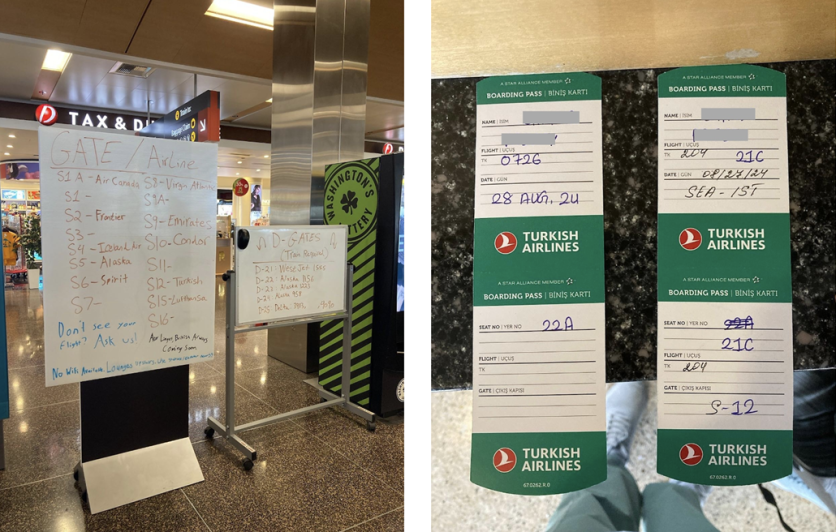SEATTLE, September 15, 2025 — "Critical infrastructure is exposed unless organizations deploy autonomous, adaptive defenses," says Sundar Tiwari, a recognized leader in agentic artificial intelligence and cybersecurity space. Tiwari raised these warnings well in advance of the ransomware attack that incapacitated Seattle-Tacoma International Airport (SEA) in August 2024. The Department of Homeland Security, in its report, also released guidelines that Tiwari highlighted, stating that critical infrastructure is at risk, especially in the age of AI-adaptive cyberattacks.

The Seattle attack unfolded exactly as Tiwari had predicted. When Rhysida struck over the Labor Day weekend, the Port's legacy systems failed, and airline staff were forced to use dry-erase boards and handwritten boarding passes, as shown in Fig 1 and Fig 2.
All the electronic screens went dark across the complex. As Senior Product Manager at a top cybersecurity firm and author of The Invisible Shield: AI-Powered Cybersecurity for Cloud-First Organizations, Tiwari has directly influenced modern cyber defense strategies through his research in agentic AI frameworks. The recent SEA breach—which compromised 90,000 personal records and halted airport operations— highlights the growing need for advanced, self-evolving protective solutions.

Agentic AI: Real-Time Autonomous Defense at Scale
Traditional, rule-based security systems simply cannot keep pace with the modern cyber threat landscape. "Relying on static defenses is akin to locking the door after attackers have already breached perimeter security," explains Tiwari. The agentic AI architecture he advocates features autonomous agents capable of perception, multi-step defense planning, and independent execution. IDC's report supports Tiwari's take on Agentic AI and cybersecurity. This is facilitated by advanced reasoning algorithms, federated learning, and large language models. Unlike legacy approaches, these agentic systems continuously adapt in real time: they perform live red-teaming simulations, push policy updates, and coordinate defensive actions across distributed networks.
Tiwari projects that, by 2026, agentic AI solutions will set the industry standard, with breach detection and response cycles shrinking by up to 90%. Gartner in its report, further adds that AI agents will halve the time for cyber attackers to exploit the system and accelerate the threat neutralization process. In this approach, distributed AI agents operate as an intelligent mesh—one set continuously monitors for anomalies, others orchestrate containment and recovery, all synchronizing within seconds. Federated learning facilitates cross-enterprise threat intelligence exchange without sharing raw data, which is mission-critical for sensitive sectors like transportation and logistics.
Yet, agentic AI presents its own attack surface. "Without comprehensive cybersecurity and robust governance, these adaptive agents themselves become high-value targets," Tiwari notes. He emphasizes strict requirements for explainable AI (XAI) and granular oversight, ensuring that all autonomous decisions are fully auditable. His work—including The Role of Explainable AI in Cybersecurity—addresses these concerns and has prompted major industry players such as NVIDIA and Microsoft to integrate agentic defense models, as seen with new deployments like Copilot Studio.
SEA Incident: A Test Case for Adaptive Security
The August 2024 Seattle-Tacoma airport attack—executed by the Rhysida group—crippled core infrastructure from check-in to baggage control, and exposed tens of thousands of identities. "This exemplifies what happens when legacy security frameworks confront modern adaptive threats," Tiwari remarks, highlighting gaps he previously documented around zero-trust architectures.
With agentic AI in place, SEA's defense could have pivoted in real time. On detection of initial intrusion—whether via phishing or unpatched vulnerabilities—specialized agents would analyze anomalous network activity, bypassing signature-reliant defenses. Once flagged, a planning agent would rapidly model lateral movement, while an execution agent could segment affected systems, reroute operationally critical services to hardened backups, and spin up decoy environments for forensic analysis.
Federated learning would enable the system to reference anonymized global data, proactively shutting down attack vectors known from similar incidents elsewhere. Simultaneously, XAI modules would document and summarize agent decisions for human security leads in real time, preventing confusion and reducing response friction. What would otherwise be weeks of disruption could be compressed to minutes—limiting data exposure, slashing recovery cost, and maintaining operational continuity.
Continuous Learning for Sustained Resilience
"Agentic AI enables dynamic, ongoing adaptation," Tiwari says. Post-incident, his framework directs agents to analyze, integrate lessons learned, and strengthen policies against emerging variants—driving true cyber resilience.
Sundar Tiwari: Advancing the Next Generation of Cyber Defense
Cybersecurity leaders like Saswata Dey recognize Tiwari not only as a thought leader but as a builder of the new cybersecurity paradigm. His contributions to one-click cloud security and research are widely cited, advancing the field of autonomous, adaptive enterprise defense. In the ongoing arms race between defenders and adversaries, agentic AI stands as the architecture ready to define cybersecurity's future.
Tiwari's body of work, notably his research on self-healing security systems, places agentic AI at the forefront of next-generation cyber defense. These systems, he emphasizes, must not just react but actively assess, adapt, and learn—essentially operating with the speed and acumen of a seasoned security team, but powered by computational efficiency. Notably, his insistence on explainable AI ensures transparency and ethical oversight, bridging the gap between complex algorithmic processes and human understanding.
The recent SEA attack, impacting a sector valued at a trillion dollars in U.S. economic activity, underscores the urgency. As Tiwari warns, key infrastructures such as airports, ports, and hospitals cannot rely on reactive security postures. His comprehensive strategy—integrating agentic AI, zero-trust architecture, and adaptive learning—offers a detailed framework for resilience and future-readiness. This approach is already influencing initiatives within federal agencies like CISA, where federated learning is increasingly part of official guidance.
In the context of escalating cyber threats, Tiwari's vision of agentic AI as an adaptive, autonomous defense mechanism is not only innovative but essential. As he articulates, the aim is to construct systems capable of preempting attacks, thereby moving cybersecurity from reactive risk management to proactive prevention.
ⓒ 2026 TECHTIMES.com All rights reserved. Do not reproduce without permission.





